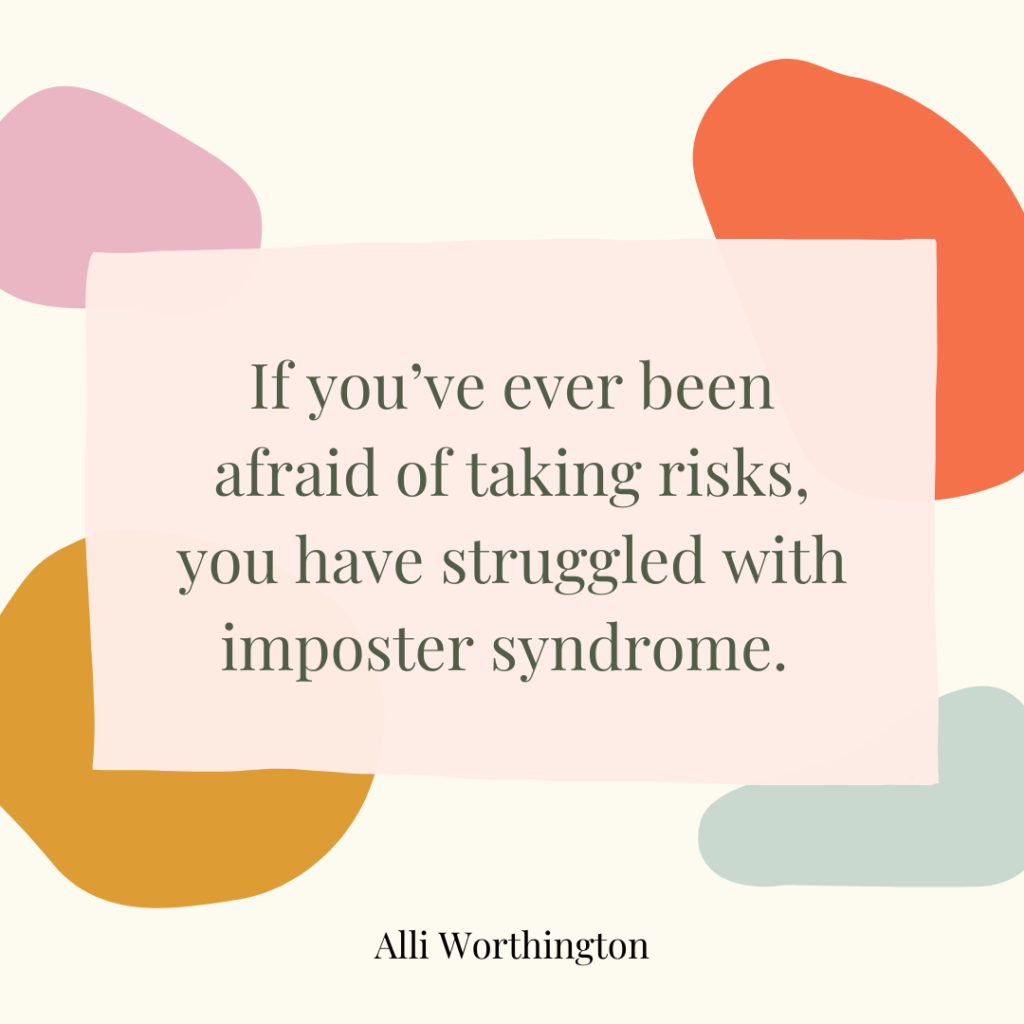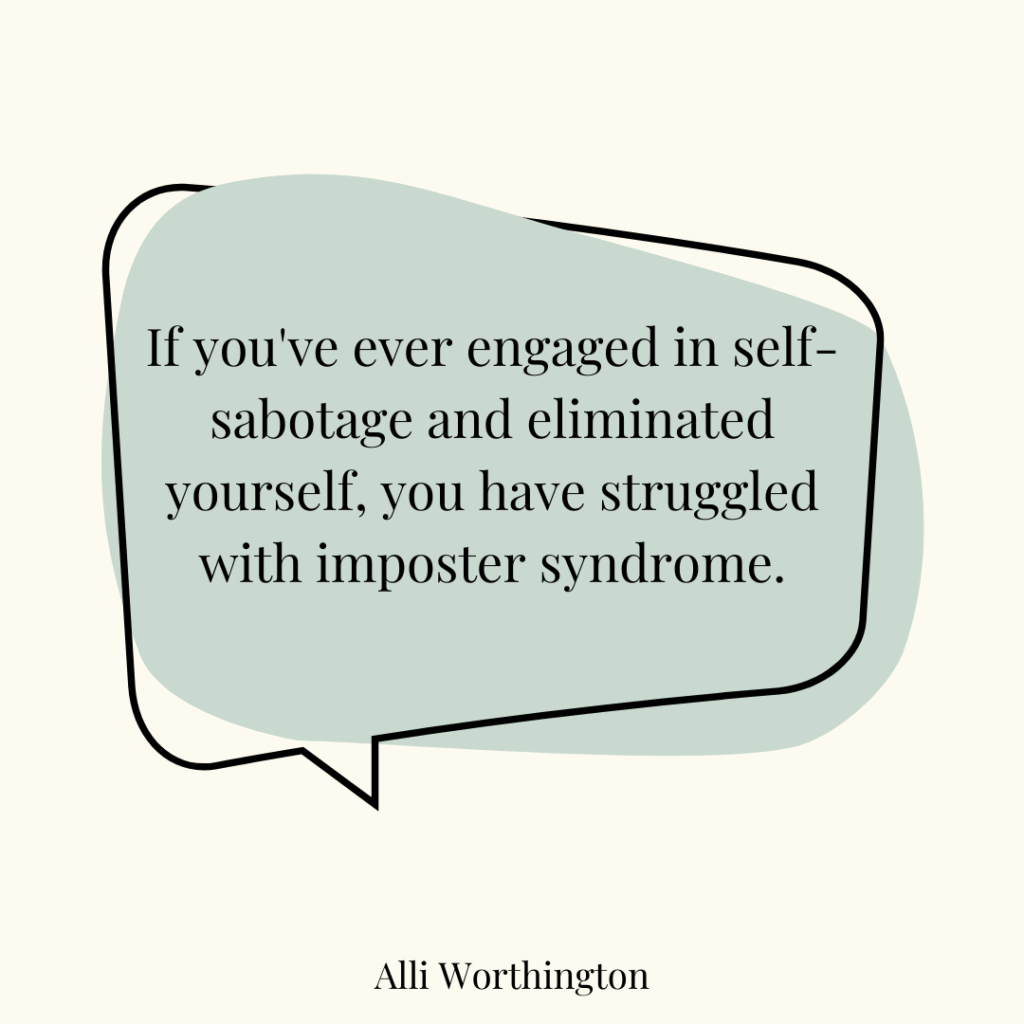You know building your brand is a crucial step to crafting your dream business. This workbook is designed with you in mind to simplify those steps.
Apply for Coaching
10 Ways to Overcome Imposter Syndrome

Do you ever feel like you have no idea what you are doing?
Have you ever felt like people could easier realize you don’t deserve to be where you are in your work?
Do you ever feel like a fraud?
If you said yes to any of these then you are in good company.
If you have ever questioned:
- How do I get over the icky feeling of self-promotion?
- How do I move forward when I feel I have so little support?
- How can I show up more authentically and get others to believe in me?
- How on earth am I going to do that again?
- What can I do to fit in?
Then I’m here to tell you you have struggled with imposter syndrome.
Imposter syndrome is a perpetual feeling of inadequacy–that someone will find out that you’re faking it and don’t deserve to be doing what you’re doing or haven’t rightly earned your job title. Imposter syndrome is a lie that about 70% of people will encounter in their lifetime.
Interestingly enough, most people who struggle with imposter syndrome don’t even realize they battle it, but that ends here because we are moving past imposter syndrome once and for all.
Although men and women from all ethnicities and backgrounds struggle with imposter syndrome, some of us deal with it more significantly than others. You’re more likely to deal with imposter syndrome if you have:
- belonged to a minority group and have felt the pressure of trying to prove you belong
- a personality type that is more anxious or neurotic
- high achieving parents
- or experienced a change in career later in life
And imposter syndrome can surface in a variety of ways.

If you’ve ever been afraid of taking risks, you have struggled with imposter syndrome.
Perfectionists constantly procrastinate and put tasks off because they believe they will know more or have more time to dedicate to it later. They minimize all of the information and knowledge that they’ve gained leading up to that time as they imagine how much more they will gain as they move forward. Instead, they focus on everything they need to know that will make them even more knowledgeable on the subject.
If you have ever experienced anxiety before you’re expected to perform, you’ve struggled with imposter syndrome.
People who question their worth attribute their success to luck. They feel that they’ve somehow tricked their employer or team leader and their inadequacies will be exposed.
They struggle to get the gumption to start and deal with an overall lack of motivation because they believe that will lead them one step closer to being exposed. This form of perfectionism is just as paralyzing as any other, even if they did have the boldness to accept a new position or assume a new responsibility.
If you’ve ever felt bad that you’ve had to research something new, you have struggled with imposter syndrome.
Natural geniuses enjoy the feeling of accessing information quickly without having to work hard to do so. That’s why when they finally encounter a problem they don’t have an easy or accurate solution to immediately, they begin to question themselves. When they recognize they need to develop a new skill or conduct further research, they struggle with their identity.

If you’ve ever struggled with accepting a compliment, you have struggled with imposter syndrome.
People who deal with imposter syndrome don’t readily accept compliments. Because of the constant belief that they are undeserving, they deflect compliments quickly and rarely internalize them. Feeling as if the person who has complimented them was “being nice” or “had to say that” continues to add pressure to their need to perform. This distrust of others also leads them to take on more than they can sometimes handle.
If you’ve ever begun to feel depressed as a result of an attempt to balance too many things, you have struggled with imposter syndrome.
Unfortunately, people who struggle with imposter syndrome don’t ask for help quickly. They also have sincere issues with setting and maintaining boundaries. When they begin to feel stressed due to the number of responsibilities they’ve accepted, they start feeling like a fraud.
Burnout only exaggerates the feelings of imposter syndrome and can even lead to a dangerous cycle: one in which you are always downplaying what you have achieved.

If you’ve ever engaged in self-sabotage and eliminated yourself, you have struggled with imposter syndrome.
People who self-sabotage will also focus on the negatives. They sometimes focus on the variety of reasons others may have for not working with them above the wide range of skills they bring to the partnership. Those who engage in this behavior often feel they have won by eliminating themselves well before anyone else could.
What a bummer.
The bright side of identifying your triggers or how imposter syndrome is showing up in your life is that you can now recognize where you’ve fallen prey to it in the past.
Now for the good news! You can conquer imposter syndrome! Begin to implement these solutions into your routine and enjoy the freedom from imposter syndrome once and for all.
How to Take Control of Imposter Syndrome
- Make a practice of putting yourself in situations where you have to learn new things. Award yourself a few imaginary bonus points if you choose to put yourself in situations where you have to rely on community. Community will help you address areas you find challenging and have avoided in the past.
- Internalize this: failing doesn’t mean you’re a failure. It means you’re doing the work, and believe it or not, you’re further along on your journey than you were before you failed. Recognize that making a mistake is a sign that you took a risk. It’s a sign that you believed in yourself enough to know that the dreams in your heart were worth the lessons you learned achieving them.
- Talk to yourself like you’re your best friend. You would never discredit your best friend or try to diminish her accomplishments. Stop doing it to yourself. Incorporate systems to reward yourself so that you don’t rely solely on external validation or other people’s approval.
- Try generalizing your criticisms and consider if you’d believe they were valid for other fields. You may not have experienced everything you’re teaching or coaching about, but that doesn’t make you any less knowledgeable or capable. Do all heart surgeons have to have had heart issues to excel? Why is it that you feel you’ve had to endure all of life’s traumas to help others beyond them?
- Stop comparing yourself with others. There’s definitely a time to admire others, but it can have devastating effects when it leads you to focus more on who you want to be than who you have become. Separating your authentic self from your ideal self will cause your self-esteem to plummet, so create a healthy point of reference and remember that although you still have a lot to learn, you have learned a lot already.
- Slow down and take inventory of what you’ve accomplished. Could it be that you’ve accomplished so much without celebrating the little milestones you’ve failed to realize how far you’ve come? Give yourself your own Wikipedia page or recreate a new resume for yourself, documenting your strengths.
- Retrain your brain. Recognize that imposter syndrome may have worked in your favor for a time. It fueled your productivity, it helped you accomplish more than you initially believed of yourself, but it is no longer supporting you. Challenge your definitions of success and reflect on where you received those messages. Think about how you can reframe your new beliefs about success and what new symbols you can add to enhance your space and signal your transformation.
- Set limits and boundaries to avoid overworking. In addition, put systems and people in place to help hold you accountable to prevent burnout. They’ll be able to offer additional help when you feel unmotivated. You may have a desire to defend yourself and bristle when they offer assistance, but their guidance will slowly help you to prioritize what truly matters to you.
- Refuse to engage in conversations where you feel encouraged to one-up someone else. Toxic competitions further fuel the adverse effects of imposter syndrome long after the contests and conversations are complete. Know that your validation should come from yourself first.
- Talk to your therapist to normalize imposter syndrome and get help getting over it. Very few people use the term imposter syndrome to identify what they’re feeling, but it is more common than you might think. One of the most powerful things you can do is talk to someone. Try journaling three things you accomplished every day.
Now go out there and be great. As to the answers to the questions you asked earlier, let me help you with those:
- How do I get over the icky feeling of self-promotion? The more you do it, the easier it will become.
- How do I move forward when I feel I have so little support? Run with your vision so intensely that others can’t help but get excited.
- How can I show up more authentically and get others to believe in me? Remember that you have something they need.
- How on earth am I going to do that again? Just like you did the first time with all your intelligence, wisdom, and expertise.
- What can I do to fit in? Eh, fitting in is overrated.
- Why did I think I could do this? Because you can. You were born for this.
For more on this subject, read about your enneagram type and imposter syndrome here to find out how your enneagram type can be impacted by imposter syndrome.
Now that we’ve identified the solutions to take control of that imposter syndrome, it’s time to continue the work. Join me over the course of the next year to be happier, healthier, and enjoy life more by clicking here. You’ll receive emails every Sunday to start the week off on the right foot and in the right headspace.
